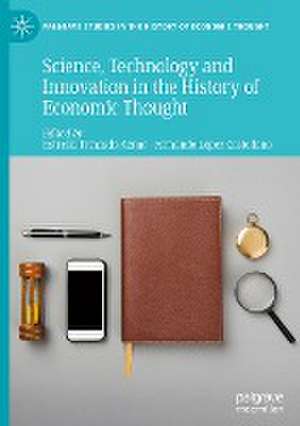Science, Technology and Innovation in the History of Economic Thought: Palgrave Studies in the History of Economic Thought
Editat de Estrella Trincado Aznar, Fernando López Castellanoen Limba Engleză Hardback – 19 oct 2023
This book aims to shed new light on our understanding of science, technology, and innovation by placing them within ideas from the history of economic thought. It will be relevant to students and researchers interested in the history of economic thought and the economics of innovation and technology.
Din seria Palgrave Studies in the History of Economic Thought
- 15%
 Preț: 640.71 lei
Preț: 640.71 lei - 9%
 Preț: 1053.13 lei
Preț: 1053.13 lei -
 Preț: 143.90 lei
Preț: 143.90 lei - 18%
 Preț: 1003.37 lei
Preț: 1003.37 lei -
 Preț: 447.84 lei
Preț: 447.84 lei - 15%
 Preț: 694.87 lei
Preț: 694.87 lei - 18%
 Preț: 889.75 lei
Preț: 889.75 lei - 18%
 Preț: 788.72 lei
Preț: 788.72 lei - 18%
 Preț: 1003.70 lei
Preț: 1003.70 lei - 15%
 Preț: 708.11 lei
Preț: 708.11 lei - 15%
 Preț: 643.16 lei
Preț: 643.16 lei - 18%
 Preț: 728.28 lei
Preț: 728.28 lei - 18%
 Preț: 730.65 lei
Preț: 730.65 lei - 15%
 Preț: 712.69 lei
Preț: 712.69 lei - 18%
 Preț: 950.66 lei
Preț: 950.66 lei - 15%
 Preț: 692.24 lei
Preț: 692.24 lei - 15%
 Preț: 641.85 lei
Preț: 641.85 lei - 18%
 Preț: 1121.62 lei
Preț: 1121.62 lei - 15%
 Preț: 642.51 lei
Preț: 642.51 lei - 18%
 Preț: 723.66 lei
Preț: 723.66 lei - 15%
 Preț: 477.40 lei
Preț: 477.40 lei - 15%
 Preț: 697.97 lei
Preț: 697.97 lei - 15%
 Preț: 695.85 lei
Preț: 695.85 lei - 18%
 Preț: 784.48 lei
Preț: 784.48 lei - 15%
 Preț: 470.56 lei
Preț: 470.56 lei - 15%
 Preț: 638.89 lei
Preț: 638.89 lei - 18%
 Preț: 736.32 lei
Preț: 736.32 lei - 15%
 Preț: 699.28 lei
Preț: 699.28 lei - 15%
 Preț: 637.78 lei
Preț: 637.78 lei - 15%
 Preț: 640.71 lei
Preț: 640.71 lei - 15%
 Preț: 636.45 lei
Preț: 636.45 lei - 15%
 Preț: 699.12 lei
Preț: 699.12 lei - 15%
 Preț: 649.06 lei
Preț: 649.06 lei - 15%
 Preț: 637.13 lei
Preț: 637.13 lei
Preț: 1111.22 lei
Preț vechi: 1355.14 lei
-18% Nou
Puncte Express: 1667
Preț estimativ în valută:
212.64€ • 223.03$ • 177.01£
212.64€ • 223.03$ • 177.01£
Carte tipărită la comandă
Livrare economică 01-15 aprilie
Preluare comenzi: 021 569.72.76
Specificații
ISBN-13: 9783031401381
ISBN-10: 3031401387
Pagini: 287
Ilustrații: XV, 287 p. 11 illus.
Dimensiuni: 148 x 210 mm
Greutate: 0.51 kg
Ediția:1st ed. 2023
Editura: Springer Nature Switzerland
Colecția Palgrave Macmillan
Seria Palgrave Studies in the History of Economic Thought
Locul publicării:Cham, Switzerland
ISBN-10: 3031401387
Pagini: 287
Ilustrații: XV, 287 p. 11 illus.
Dimensiuni: 148 x 210 mm
Greutate: 0.51 kg
Ediția:1st ed. 2023
Editura: Springer Nature Switzerland
Colecția Palgrave Macmillan
Seria Palgrave Studies in the History of Economic Thought
Locul publicării:Cham, Switzerland
Cuprins
1. Invention, institutional change and economic development: from Scottish Enlightenment to the IPE.- 2. Friedrich List, contemporaries and followers: national innovation policies revisited.- 3. Transhumanism as alienation in Marx's humanist approach.- 4. Energy efficiency, productivity and the Jevons paradox.- 5. Max Weber: Science, Technology and Knowledge.- 6. Schumpeter and Austrian economics on innovation.- 7. The Neoclassical approach, its crisis and the Schumpeterian echo in the current paradigm of the economic analysis of Technological Change.- 8. Some misconceptions regarding innovation (and how reading the classics might help to overcome them).- 9. Sustainability and technological progress.- 10. Technological unemployment as a historical debate.- 11. On the controversies on capital as a selection between paradigms.- 12. Influence of Schumpeter in the national context.- 13. Institutional problems for innovation although inventions are available.- 14. Conclusion and future research.
Notă biografică
Estrella Trincado Aznar is Professor of History of Economic Thought at the Complutense University of Madrid.
Fernando López Castellano is Professor of Economics at the University of Granada.
Fernando López Castellano is Professor of Economics at the University of Granada.
Textul de pe ultima copertă
This book provides an overview of the importance of science, technology, and innovation in the history of economic thought. It charts how science has responded to societal needs and global challenges to highlight the way in which knowledge and technology have been used to benefit society. Particular attention is given to modern concerns, such as climate change, technological unemployment, and social unrest, which are contextualised within the work of the Scottish Enlightenment, Marx, Weber, and Schumpeter. Broader debates, including the relationship between invention and economic development, the alienation of labour, and institutional change, are also considered.
This book aims to shed new light on our understanding of science, technology, and innovation by placing them within ideas from the history of economic thought. It will be relevant to students and researchers interested in the history of economic thought and the economics of innovation and technology.
Estrella Trincado Aznar is Professor of History of Economic Thought at the Complutense University of Madrid.
Fernando López Castellano is Professor of Economics at the University of Granada.
Estrella Trincado Aznar is Professor of History of Economic Thought at the Complutense University of Madrid.
Fernando López Castellano is Professor of Economics at the University of Granada.
Caracteristici
Highlights how technological change has created unemployment at various points in the past Examines how ideas of wellness, sustainability, and the limits of growth have changed over time Explores how human and economic capabilities have been increased due to innovation and technological development
